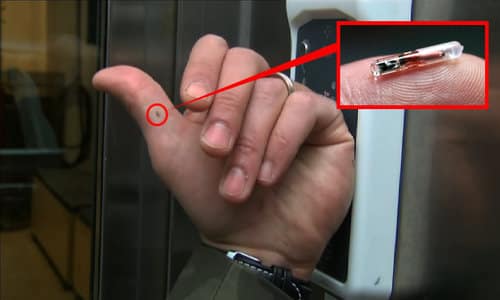Human Implanted Microchips Back In The Spotlight

Human implanted microchips are back in the news after biotech company Blackrock Neurotech, based in Salt Lake City announced this week it has already implanted brain chips in dozens of patients.
'We are the only company with direct-brain BCI implants in humans,' Marcus Gerhardt, Blackrock's co-founder, told DailyMail.com.
'Our implantable arrays have enabled people to connect directly to computers, control robotic arms and wheelchairs, play video games, even regain sensation - with just their brain signals.
Blackrock's technology uses an implantable microchip that has 96 arrays -- small needle-shaped brain chips that can read and stimulate electrical signals.
It can be placed anywhere on the brain's surface. Multiple devices can be placed on the same person's brain.
After implantation, the chip detects electrical signals generated by the wearer's thoughts.
Machine learning software decodes these signals into digital commands such as cursor movements, which can be used to control prosthetics and computer equipment.
The company is now seeking FDA approval for devices built for use outside the lab and to be used at home.
Tech mogul Elon Musk has also launched similar plans with Neurolink, an implantable device he hopes can be brought to market in the near future.
The use of microchip implants to biohack our body is nothing new and the applications are already numerous and growing.
Today, more than 50,000 people have elected to have a subdermal chip surgically inserted between the thumb and index finger, to serve as their new swipe key, or credit card.
Tech company Walletmor has developed a new app called Purewrist, which is a digital wallet combined with a microchip that can be installed in your hand. Once the chip is installed, a person can then use the app and chip to make payments to businesses that also use the app.
Walletmore's chip is quite light and is only a bit bigger than a grain of rice and is composed of a microchip and an antenna, which is surrounded by biopolymer. The Chief Executive Officer of the Company, Wojtek Paprota claims that it is entirely safe and also has regulatory approval.
Walletmore has priced the implant procedure at $299 and says the system can be used to make everyday, normal transactions.
"The implant can be used to pay for a drink on the beach in Rio, a coffee in New York, a haircut in Paris - or at your local grocery store," founder and chief executive Wojtek Paprota said in a statement to the BBC. "It can be used wherever contactless payments are accepted."
The microchip does not need a battery to function nor does it need any other power source which makes it quite attractive to the users.
A 2021 survey conducted in the European Union and the United Kingdom came up with the result that at least 51 per cent of people will consider having a chip implanted in their body.
On the other side of Europe Sweden has been rapidly expanding it's use of microchip technology for quite some time with tens of thousands already microchipped:
Notes and coins now make up less than 1 percent of Sweden's economy which is ironic considering it was the first European country to issue modern banknotes, in 1661.
"No cash accepted" signs are now the norm in shops across Sweden as payments go digital and mobile but many Swedes want to take it to the next level as they blend tech with the human body.
Microchip implants that give people the ability to conduct financial transactions, monitor their health (including vaccination status) and even replace keycards to allow them to enter offices and buildings are the new rage as thousands have already been implanted.
Many technological enthusiasts believe this is the next logical step in a digital society that is quite happy to give up privacy for convenience. That convenience factor is a big reason commuters on the SJ Rail transit system have traded cash for chips:
Many Bible Prophecy experts believe each of these steps is taking us closer to global acceptance of a digital "mark" commonly called "The Mark of the Beast" that will merge technology and commerce with political and religious allegiance as described in the Book of Revelation.
Most Christians recognize that current chip implants are not the actual "mark of the beast", yet there is concern that acceptance of such technology is conditioning people for when the real one does come along.
What often starts off as voluntary can just as easily become mandatory and whereas tech itself may be neutral, in the hands of the wrong person it could be extremely dangerous. Imagine the technology of today in the hands of Hitler.
There are also growing fears that an economic collapse and "currency reset" could bring about an era of forced digital cash that would be necessary to conduct commerce. Digital cash with biometric practicality would seem to make a perfect union for convenience and security.
Christians have long debated the meaning of the "mark of the beast". Our generation, however, appears to be the first to have the technology to fulfill this prophecy.
Soon, you may have to answer the question: 'would you get chipped'?
Dig deeper into the Book of Revelation to explore the "mark of the beast" and other current issues facing our world with our Decoding The Future DVD Series - now on sale here.
https://www.prophecynewswatch.com/article.cfm?recent_news_id=6063
No comments:
Post a Comment